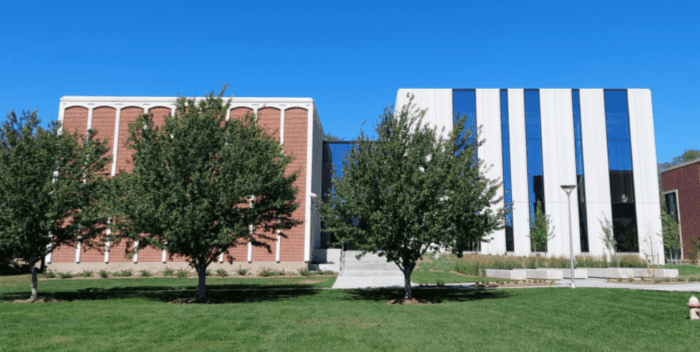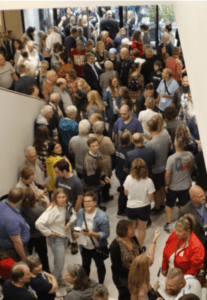Concordia dedicates $17.5M Borland Center
Photo description: CUNE’s Borland Center for Music and Theatre
Photo credit: Nora Betts
Cohen Carpenter
Sower Staff
Hundreds of people turned out last weekend as Concordia dedicated the $17.5 million Borland Center for Music and Theatre, capping a long construction process delayed by the pandemic, weather and shortages of workers and supplies.
“May this building become both a space and a place where God’s Word, the gift of music and the arts are
joy; where we speak to one another with psalms, hymns and spiritual songs, singing and making music from our heart,” Concordia President Bernard Bull said during the ceremonies.
The long-planned music and theater building is connected to half of the old Music Building, which opened in 1966. Half of it was torn down as the expansion project began. The new space has been in use since the beginning of the semester.
“The new Borland Center for Music and Theatre is an improvement from the old music building in a number of ways,” said senior Isaac Weander. “Though it is not completed yet, the new recording facilities will allow for new fields of study at Concordia, hopefully attracting a unique group of students.”
Weander, a K-12 music education major, has spent many hours in the halls of the music building – new and old – and the improvised music spaces during construction.
“From the spring of 2021 until the fall of 2023, music classes were held in over 10 buildings across campus,” he said, and added he was happy to have the new building open in August.
“As someone who spends a large amount of time in [the choir and bands rooms], I am still in awe every time I walk in from the grandeur of them both,” Weander said. “They are inviting and encouraging as we settle in to make music.”
Senior Grace Miller, a music education major, said students adapted to the temporary spaces and “were very good nomads” during that time.
“I played organ, and we had to coordinate organ practices with all the other students,” Miller said. “We had to practice on the electric toasters in the basement of Weller. We call them toasters; they’re just electric organs without any pipes or anything.”
There had been talk about a new music building for years, or at least making much-needed improvements to the old building.
In 1995, when Dr. David Held was the chairman of the music department at Concordia, there were already calls for improvements to the music facility.
“We were trying to do many of the projects that are now part of the new building,” Held recalled. “Especially needed was an elevator, handicap access to the entire building and a new HVAC system.”
Held, who retired in 2000, still lives in Seward and is excited about the new developments on campus.
“I do keep up with the activities at Concordia. I was excited to see the announcement of the new building and am even more excited to see the completion of the project,” he said.
Alumni also have voiced their excitement. Lisa Vogt was a student at Concordia from 1991 to 1995. An
education major with a concentration in music, Vogt spent her fair share of time in the old music hall.
“We would spend a lot of time in there, and we had a lot of fun,” Vogt said. “You would always hear singing and instruments from the main lobby… there wasn’t very much soundproofing at all.”
That was a common theme among the complaints about the old building – the lack of soundproofing, modern recording devices or even something as simple as an elevator.
By spring of 2021, $17.5 million had been raised for the construction of a 46,544-square-foot complex that would improve on everything the old building did right and, more importantly, would remedy its shortcomings.
With an original planned opening in the fall semester of 2022, the new building ended up an entire year behind schedule, to the dismay of seniors and faculty.
“Nobody is blaming anyone,” said Dr. Kurt von Kampen, a professor of music and chair of the Music Department. “We probably picked the worst time in recent history to design and build a building. The pandemic caused a lot of delays. It was harder to find workers and sometimes when they showed up, there was no product to install.”
Walking through the lobby of the new building, the design and vision are apparent. Natural light is abundant in the halls, classrooms and recording spaces. While some areas are still a work in progress, including IT installations, most of the more important features are up and running.
The recital hall, band/orchestra rehearsal space and the choir area all have acoustic banners, a feature missing in the old building. These banners make the rooms less reverberant, refining the quality of the sound being produced. Also, the building is designed so that various practice areas are scattered throughout the floorplan, so groups do not disturb each other.
When asked what was the biggest improvement in the new building, von Kampen
said, “The elevator! That’s number one. We needed an elevator to accommodate those who can’t climb steps and also for safety reasons related to the constant need to move equipment around the building.”
Further aiding accessibility is the ramp that leads to the building entrance on either side.
Professor of Music Dr. Elizabeth Grimpo said the new center will benefit Concordia as a university and students.
“The new facility itself will help us attract new students, and the excellent features within the building will allow us to become even better musicians,” Grimpo said.
Josiah Horvath contributed to this story.














